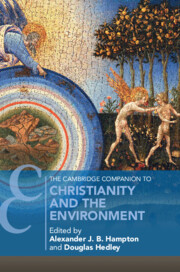Book contents
- The Cambridge Companion to Christianity and the Environment
- Cambridge Companions to Religion
- The Cambridge Companion to Christianity and the Environment
- Copyright page
- Contents
- Figures
- Contributors
- Preface
- 1 Introduction
- Part I Concepts
- 2 Naturalism, Supernaturalism, and Our Concern for Nature
- 3 From Disenchantment to Enchantment
- 4 Human and Nonhuman Animals from Secular and Sacred Perspectives
- 5 Anthropocentrism, Biocentrism, Stewardship and Co-Creation
- 6 Participation and Nature in Christian Theology
- 7 The Book of Nature
- Part II Histories
- Part III Engagements
- Index
- Cambridge Companions to Religion
- References
5 - Anthropocentrism, Biocentrism, Stewardship and Co-Creation
from Part I - Concepts
Published online by Cambridge University Press: 21 July 2022
- The Cambridge Companion to Christianity and the Environment
- Cambridge Companions to Religion
- The Cambridge Companion to Christianity and the Environment
- Copyright page
- Contents
- Figures
- Contributors
- Preface
- 1 Introduction
- Part I Concepts
- 2 Naturalism, Supernaturalism, and Our Concern for Nature
- 3 From Disenchantment to Enchantment
- 4 Human and Nonhuman Animals from Secular and Sacred Perspectives
- 5 Anthropocentrism, Biocentrism, Stewardship and Co-Creation
- 6 Participation and Nature in Christian Theology
- 7 The Book of Nature
- Part II Histories
- Part III Engagements
- Index
- Cambridge Companions to Religion
- References
Summary
Distinguishing between kinds of anthropocentrism and of biocentrism helps to disclose that White’s critique of theistic religions as anthropocentric and despotic miscarries, as does the different critique on the part of Passmore of ‘Greco-Christian arrogance’. The longstanding stewardship tradition of Christianity, Judaism and Islam facilitates an eco-friendly approach to the environment, particularly in its biocentric versions, and can be defended against criticisms from Palmer and Lovelock. Southgate, who misunderstands biocentrism as synonymous with Deep Ecology, favours both co-creation and stewardship; these approaches can be combined with each other and with Bauckham’s theme of the community of God’s creatures. Northcott does well to trace back modern ecological problems to seventeenth-century anti-communal and possessive individualism and the attitudes and practices emerging therefrom, but his communitarian and nature-friendly approach, while rightly understanding humanity as ‘dependent rational animals’ (MacIntyre), needs to become more cosmopolitan if these global problems are to be solved.
Keywords
- Type
- Chapter
- Information
- Publisher: Cambridge University PressPrint publication year: 2022
References
Selected Bibliography
- 4
- Cited by

